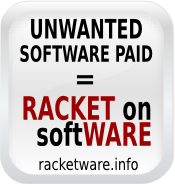Purchase Guide
Disclaimer: the present Guide is the translation of a Guide intended to French residents. Legal issues may differ from country to country. This translation is thus provided as a mere suggestion for building similar Guides adapted to other countries.
What is always worth a try
If you have the opportunity to buy a naked PC (good resellers), do not hesitate: this is good for the current issue. Otherwise, you should attempt to be reimbursed at the moment you buy the machine, especially if you are dealing with a small reseller. The reseller should then arrange things with the manufacturer.
According to your preference: you may ask the reseller immediately, or you may wait until he thinks the business is done. The important point is to show that, for you, this is part of your choice. Regarding the value, it is up to you. It might be better to give way a little rather than go through a long procedure. However, negotiating 80 Euros seems to be a minimum. In case of refusal, you should request to be clearly indicated on the invoice the fact that you have requested to buy the hardware without any software. A few buyers have obtained that the hard-disk be formatted in the shop, and that a written statement be signed by the reseller. If you have some time before buying, take the opportunity to exert some pressure on the vendor by filing requests (models of letters).
Watch out for tattoo!
You do not want pre-installed software because you plan to use other softwares, including another operating system. You might be hindered in doing so by what is called tattoo. This is used in some models from certain brands (in particular Packard-Bell, Gericom, HP or Compaq). Tattooing affects principally the possibility to install a new operating system. Note that this is different from difficulties one may encounter in recognizing some of the computer's devices, due to the absence of suitable drivers (to be downloaded, if they exist). You should check on the internet whether the particular model/brand you wish to buy is tattooed or not.
Two behaviors are possible towards the reseller. You can either request a written certificate that the PC is not tattooed and that it will work with another operating system, or have a try at your own risks. In the latter case, if the PC happens to be indeed tattooed, either you will have to deal with removing the tattoo, or you will return the PC to the reseller: the law enforces warranty in the case of lacking information conerning an important feature of the product. Obviously, if the reseller informs you of the tattoo before you buy the machine, you'd better choose another model (otherwise, it will be difficult to ask for a return).
Information you should gather
Take special care to keep all informations you may have got about the computer, either through advertisement, posters at the reseller's (take pictures!), or on the web. You can also ask questions to the reseller.
You are particularly interested by the exhaustive list of all the softwares, with the version type (OEM, tryware, …) when it is indicated. The purpose of this is to evaluate the proportion taken by the software licenses in the total cost of your purchase. Obviously, you will not rely on the advertisement claiming “Windows for 1 Euro”. You will then have to look for the real price: pay attention to get the price of OEM or similar versions, when available. Otherwise, get the price of boxed versions. Remember that in the Gutzwiller vs Acer case (France, July 2007), the judge has estimated that in the absence of clear indications, from the reseller, on the exact nature of the license (complete version or not), the price was to be evaluated in the most favorable way for the customer.
Regarding the license agreements (EULA), it is most of the time a waist of time to try to get them before the actual purchase. However, and contrary to what one may imagine, not obtaining the EULA or the conditions of the reimbursement is rather favorable to you: as these documents are not shown to you before the purchase, they cannot be opposed to you. One thing is sure: the text of the EULA should appeared at first boot. If this is not the case, you are probably dealing with a computer which is not “first hand”, and you should request a full return.


